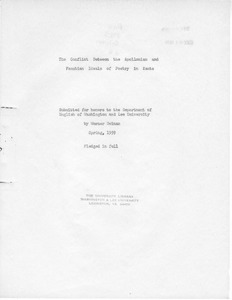| dc.rights.license | In Copyright | en_US |
| dc.creator | Deiman, Werner John | |
| dc.date.accessioned | 2023-10-20T17:40:03Z | |
| dc.date.available | 2023-10-20T17:40:03Z | |
| dc.date.created | 1959 | |
| dc.identifier | WLURG038_Deiman_thesis_1959 | |
| dc.identifier.uri | https://dspace.wlu.edu/handle/11021/36325 | |
| dc.description.abstract | It is almost impossible for us to reach any conclusions concerning Apollonian-Faustian dicotmy in his soul. I do think his was an Apollonian mind and sensibility of the moment. I am sure he forgot few of
those things which affected him so deeply; but, nevertheless, he was unable to screen anything from his sight; indeed, in a sense, his delicate sensibilities were constantly barraged by literally everything with which they came into contact. Grecian urns, Elgin marbles, and poverty-stricken hovels in Scotland affected equally, I believe, in their widely varying ways, the Apollonian aesthete and Faustian Britisher and member of society. . . . As for what Keats did write and think, I think we must remember that, perhaps more than for Beauty, Keats wrote with a keen eye for the entlre truth and wholeness of life. Life had not, it may be argued, been good to him. In a sense the beauty which his eye caught and the form which his own powers made possible were all that he had, everything in which he could have consummate faith. Even his friends and their motives he eventually saw as almost purely egotistical. But beauty was very tangibly real for Keats, and he was always conscious of its mutability and mystery. . . . When he was prostrate in awe and, like Milton's Adam,"weake against the charm of Beauties powerful glance," I think Keats relapsed into that Apollonian state of revrie which Nietzsche described so beautifully. But, when nights of intoxication were over; when the sun shon again, illuminating the wretched, the horrble, the squalid; when he himself felt anew the pain of his disease and saw the agonies and trifes of human hearts -- then, I think, the Faustian man resumed his course of work with a proper attention to all that constitutes suffering in life -- for which Beauty is perhaps a sole compensation and consolation. [From concluding section] | en_US |
| dc.format.extent | 115 pages | en_US |
| dc.language.iso | en_US | en_US |
| dc.rights | This material is made available for use in research, teaching, and private study, pursuant to U.S. Copyright law. The user assumes full responsibility for any use of the materials, including but not limited to, infringement of copyright and publication rights of reproduced materials. Any materials used should be fully credited with the source. | en_US |
| dc.rights.uri | http://rightsstatements.org/vocab/InC/1.0/ | en_US |
| dc.subject.other | Washington and Lee University -- Honors in English | en_US |
| dc.title | The Conflict Between the Apollonian and Faustian Ideals of Poetry in Keats | en_US |
| dc.type | Text | en_US |
| dcterms.isPartOf | WLURG038 - Student Papers | en_US |
| dc.rights.holder | Deiman, Werner John | en_US |
| dc.subject.fast | Keats, John, 1795-1821 -- Criticism, interpretation, etc. | en_US |
| dc.subject.fast | English poetry | en_US |
| dc.subject.fast | Suffering in literature | en_US |
| local.department | English | en_US |
